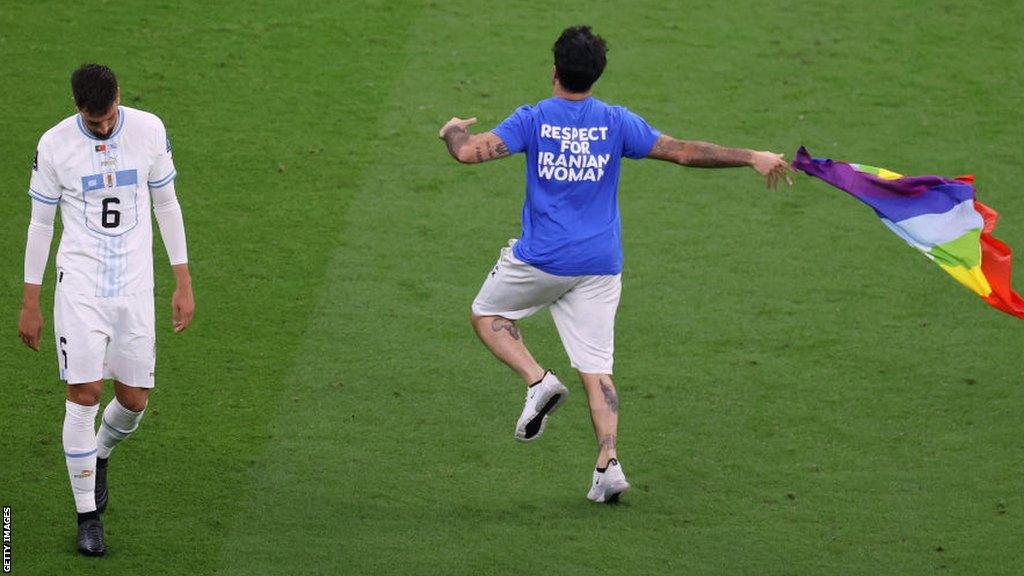World Cup 2022: Protester invades pitch during Portugal v Uruguay
- Published

The protester invaded the pitch during the second half of Portugal v Uruguay
Fifa World Cup |
|---|
Host nation: Qatar Dates: 20 November-18 December Coverage: Live on BBC TV, BBC iPlayer, BBC Radio 5 Live, BBC Radio Wales, BBC Radio Cymru, BBC Sounds and the BBC Sport website and app. Day-by-day TV listings - Full coverage details |
A protester carrying a rainbow flag invaded the pitch during the World Cup game between Portugal and Uruguay.
Mario Ferri wore a T-shirt with "Save Ukraine" on the front and "Respect for Iranian woman" on the back.
Stewards chased him and he dropped the flag before being taken off the field at Lusail Stadium.
Italian activist Ferri was released by authorities "after a brief detention", said the Italian foreign ministry.
Qatar's Supreme Committee confirmed he "was released shortly after being removed from the pitch" and that his embassy had been informed.
It added his Hayya Card - an entry permit to Qatar for World Cup attendees - had been cancelled and "he has been banned from attending future matches at this tournament".
The decision to stage the World Cup in Qatar, where homosexuality is illegal, has been criticised by LGBTQ+ groups.
How do LGBTQ+ football fans feel about the Qatar World Cup?
Ferri has staged similar protests before, including at the 2014 World Cup in Brazil, where he raised the issue of children living in poverty.
He posted on social media later on Tuesday to say "I am free", adding: "Thanks for all the messages of love coming to me from the world, Iran and Ukraine."
The Italian also shared messages about the plight of Iranian women, Qatar's attitude towards support for LGBTQ+ groups and the Russian invasion of Ukraine.
World governing body Fifa wrote to all 32 competing teams in the lead-up to the tournament in Qatar to tell them to "focus on the football".
Qatar World Cup ambassador Khalid Salman called homosexuality "damage in the mind" before the tournament, comments which Human Rights Watch said were "harmful and unacceptable".
England, Wales and other European nations decided not to wear the OneLove armband at the World Cup after Fifa threatened captains with sporting sanctions.
The captains, including England's Harry Kane and Gareth Bale of Wales, had planned to wear the armband during matches to promote diversity and inclusion.
Meanwhile, Iran players declined to sing their national anthem before their World Cup opener against England in an apparent expression of support for anti-government protests.
Protests in Iran were sparked by the death in custody in September of Mahsa Amini, a 22-year-old woman who was detained by morality police for allegedly breaking the strict rules around head coverings.
The Iran players did sing the anthem before their second game against Wales.
Portugal beat Uruguay 2-0 in Monday's Group H game.
BBC Analysis editor Ros Atkins looks at the controversies around the Qatar World Cup
World Cup chief says 400-500 migrant workers died
The treatment of migrant workers has been another issue around the World Cup, after an investigation by The Guardian, external claimed 6,500 migrant workers had died while building the infrastructure for the tournament.
Qatar World Cup chief Hassan Al Thawadi told Piers Morgan in an interview broadcast on Monday that an estimated 400-500 migrant workers died "as a result of work connected to the World Cup".
Organisers have always maintained that three migrant workers died on stadia sites with a 37 further fatalities of stadia workers off-site due to non-work reasons.
Qatar's Supreme Committee later sought to clarify the figure quoted by Al Thawadi, saying they covered "the period of 2014-2020 for all work-related fatalities nationwide in Qatar, covering all sectors and nationalities".
However Nicholas McGeehan, director of human rights organisation FairSquare, said it was "the latest example of Qatar's inexcusable lack of transparency" on workers' deaths.
"We need proper data and thorough investigations, not vague figures announced through media interviews," he said.
"Fifa and Qatar still have a lot of questions to answer, not least where, when, and how did these men die and did their families receive compensation."

Get the latest results and goal notifications for any team at the Fifa World Cup by downloading the BBC Sport app: Apple, external - Android, external - Amazon, external


Get your daily dose of Fifa World Cup reaction, debate & analysis with World Cup Daily on BBC Sounds
